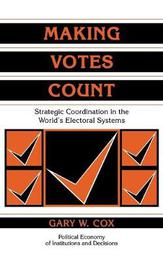
|
Making Votes Count: Strategic Coordination in the World's Electoral Systems
Hardback
Main Details
| Title |
Making Votes Count: Strategic Coordination in the World's Electoral Systems
|
| Authors and Contributors |
By (author) Gary W. Cox
|
| Series | Political Economy of Institutions and Decisions |
|---|
| Physical Properties |
| Format:Hardback | | Pages:360 | | Dimensions(mm): Height 235,Width 160 |
|
| Category/Genre | Political economy |
|---|
| ISBN/Barcode |
9780521585163
|
| Classifications | Dewey:324.6 |
|---|
| Audience | | Professional & Vocational | | Tertiary Education (US: College) | |
|---|
| Illustrations |
16 Tables, unspecified; 12 Line drawings, unspecified
|
|
Publishing Details |
| Publisher |
Cambridge University Press
|
| Imprint |
Cambridge University Press
|
| Publication Date |
28 March 1997 |
| Publication Country |
United Kingdom
|
Description
This book investigates strategic coordination in elections worldwide. Although the classics of electoral studies have dealt with issues of coordination, this is the first book that employs a unified game-theoretic model to study strategic coordination--including both strategic voting and strategic entry--worldwide and that relies primarily on constituency-level rather than national aggregate data in testing theoretical propositions about the effects of electoral laws.
Reviews"Every serious scholar of political systems should read this book...Cox is a master when it comes to explaining ideas generated by a logic-based theory...this book is a very important contribution to our knowledge about electoral systems. It will be the major book in this area for some time to come." Melvin Hinch, American Political Science Review "...this is a great book, a must for all those interested in the study of elections. Cox powerfully demonstrates the fruitfulness of looking at the impact of electoral systems from the perspective of formal theory, provided this is combined with solid empirical analysis." Andre Blais, Canadian Journal of Political Science "This book is a unique contribution to the fields of comparative politics and formal political theory. It offers a model integrating many diverse aspects of electoral competition that together bring into existence systems of national poltical parties. Gary Cox combines social choice theory, public choice theory, spatial theory, and the institutional approach to electoral studies to reach a new level of understanding of political competition in democracies. Gary Cox's new book is not only a theoretical study, but also a useful reference on comparative electoral institutions. ...the suthor also draws attention to such often overlooked institutions as rules of candidate nomination and party registration." Olga Shvetsova, Political Science Quarterly
|